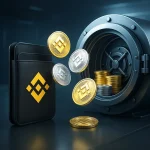Blockchain and the Internet of Things (IoT) are two of today’s most influential technologies, each shaping our digital world in profound ways. When combined, their potential multiplies, laying the groundwork for an era of trusted automation, enhanced security, and unprecedented efficiency across industries.
What is the Internet of Things (IoT)?
The Internet of Things (IoT) refers to the ever-growing network of physical devices—ranging from home thermostats and wearables to industrial sensors and smart vehicles—connected to the internet. These devices collect and exchange data, enabling smarter processes, automation, and insight-driven decisions.
However, as our dependency on IoT grows, so do the concerns about data privacy, security, and device coordination. This is where blockchain steps in.
The Power of Blockchain Technology for IoT
Blockchain is a distributed ledger technology that records transactions across multiple computers, making data tampering virtually impossible. Its features align perfectly with the needs of IoT networks:
- Decentralization: Removes single points of failure, reducing the risk of attacks.
- Transparency: All network participants have access to the same immutable data.
- Security: Blockchain’s cryptographic principles make unauthorized access and data modification exceptionally difficult.
Why Use Blockchain for Connected Devices?
Traditional IoT architectures are largely centralized, relying on cloud servers for data processing and device management. This can lead to bottlenecks, higher latency, and vulnerabilities to hacking.
By leveraging blockchain technology for IoT, we unlock:
- Trustless Automation: Devices can interact autonomously using smart contracts, executing actions only when predefined conditions are met.
- Tamper-Proof Logs: Every device action is recorded immutably, supporting compliance, audit trails, and accountability.
- Enhanced Device Authentication: Blockchain networks allow for secure device onboarding and identity management, thwarting impostor threats.
Real-World Use Cases of Blockchain in IoT
1. Supply Chain Management
Sensors track products from origin to consumer. Each checkpoint is logged on the blockchain, ensuring transparency and product authenticity.
2. Smart Cities
Connected infrastructure (like waste systems or traffic controls) uses blockchain to share data between city services, improving efficiency and coordination without risking centralized failure.
3. Energy Management
Decentralized IoT devices like home solar panels can securely trade and account for generated electricity peer-to-peer, all settled via blockchain-based smart contracts.
4. Healthcare Monitoring
Blockchain ensures the integrity and privacy of patient-generated health data collected by wearable devices.
Challenges: What Blocks Blockchain in IoT?
Despite the enormous potential, several hurdles must be addressed for widespread adoption:
- Scalability: IoT devices generate massive volumes of data, which can overwhelm current blockchain networks.
- Resource Constraints: Many IoT devices have limited processing power and storage, making them less compatible with heavy blockchain protocols.
- Interoperability: Integrating diverse IoT hardware and software with various blockchain platforms remains a technical hurdle.
How to Get Involved in the Blockchain IoT Revolution
If you’re passionate about the future of decentralized, tamper-proof IoT solutions, consider exploring blockchain-centric platforms and services. One such trusted hub for blockchain enthusiasts is Bitget.
Discover Bitget: Your Gateway to Blockchain Innovation
Whether you are a developer seeking tools or an investor spotting opportunities, Bitget connects you to a thriving blockchain ecosystem. Sign up using the referral code cryptonew0 for exclusive benefits and to stay ahead of the curve in blockchain and IoT developments.
Join Bitget with Referral Code cryptonew0
Leverage secure trading, access advanced analytics, and become part of a leading global platform passionate about blockchain’s potential for real-world transformative applications.
Key Takeaways
- Blockchain enhances IoT with stronger security, decentralized decision-making, and automation through smart contracts.
- The convergence of these technologies is already driving innovation in logistics, cities, energy, and healthcare.
- To stay engaged with the latest blockchain advancements, register for Bitget with code cryptonew0.





